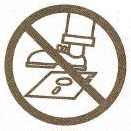|
comaerror posted:Even though I'm a total noob at meditation, I've noticed this exact same thing spilling over into my normal day. Like, "Oh, I was just mad about a thing. Welp, back to what I was doing" and so on. Ajahn Chah would often respond to situations in the same way, by saying "It's just like this." I find myself saying it to myself throughout my daily life quite a bit.
|
|
|
|

|
| # ? May 15, 2024 05:13 |
|
I'm curious now, because I really can't think of any reason whatsoever why a person shouldn't use Mala beads basically however they wish? Especially if they seem to find it helpful? If the only value people had ever found in them was some utility in keeping track of breaths/mantra counts, would they have stuck around so long? If I'm missing some way that Mala beads could be misused or harmful, please explain? Never heard of Mala beads being used incorrectly, just untraditionally, though I am no expert on them whatsoever.
|
|
|
|
Prickly Pete posted:Ajahn Chah would often respond to situations in the same way, by saying "It's just like this." One of my favorite quotes is, "In the garden of gentle sanity, may you be bombarded by coconuts of wakefulness." from Chogyam Trungpa Rinpoche. It hit true today, I had a pretty clean breakup recently but was getting the last of my stuff and parted with my key which was a little sad, and then I go to get my bike to haul it back to my place and discover it's been stolen! I think that before meditation I might have started to tear up or feel angry but instead a brief pang of sadness mixed with curiosity and maybe even a little humor because I setup the bike-rack on the car without even looking to see if the bike was there (and I drove right by where it would have been and didn't notice!) After that I just remarked to myself, "Yup, this is another coconut, reminding me that unexpected things happen no matter my circumstances and that's just that." It felt nice to let it wash past me and continue with my drive home.
|
|
|
|
The-Mole posted:I'm curious now, because I really can't think of any reason whatsoever why a person shouldn't use Mala beads basically however they wish? Especially if they seem to find it helpful? Coming from the Tibetan tradition, so already unorthodox, they are even used for things like small decision making divinations. In terms of using it "wrongly" the only thing I could think of would be that certain materials are considered auspicious or inauspicious for certain activities. Like a human bone mala is used for wrathful deities preferably. However not using the right mala isn't going to cause you to get smited or something, and you should use what is expedient. It's usually better to do a practice incompletely or inaccurately than to not practice at all. I would actually consider the use to count breaths totally appropriate. I think the "issue" would be that by engaging additional senses to kind of "fill in" versus distraction, one doesn't actually address the problem of distraction, one simply buries it. It doesn't solve anything. That said, use things for ways that work. Sometimes I spin a prayer wheel when I'm going to be meditating for an extended period because it lets me "come back" to it and if it stops spinning, I know my mind has wandered.
|
|
|
|
The-Mole posted:I'm curious now, because I really can't think of any reason whatsoever why a person shouldn't use Mala beads basically however they wish? Especially if they seem to find it helpful? You can certainly use them however you wish. I didn't say that was an "incorrect" use, I just said its not how they are used traditionally. The main point I really wanted to get across to No More Toast was that using them as an external distraction when practicing shamatha is definitely not what they are used for. Calm abiding meditation is all about the present moment and using devices to distract you goes very much against that idea, I think. I welcome comment on this. My understanding is that mala beads are traditionally used for counting when chanting, praying, etc. especially during the Tibetan ngondro when you're counting to very high numbers for a specific purpose. I assume that, given their role in accumulation of merit etc, they are held as precious by many practitioners. Interestingly, when I went to meet with my meditation instructor today, he suggested using them for a purpose that I never heard of so I guess you never know...
|
|
|
|
he1ixx posted:You can certainly use them however you wish. I didn't say that was an "incorrect" use, I just said its not how they are used traditionally. The main point I really wanted to get across to No More Toast was that using them as an external distraction when practicing shamatha is definitely not what they are used for. Calm abiding meditation is all about the present moment and using devices to distract you goes very much against that idea, I think. I welcome comment on this. I think it's up to the individual, as most things seem to be in this practice. Does using the beads to keep you in the present moment work? Then continue using them. After a while try not using them, just to change things up. Everything else changes, no need for your practice to be any different 
|
|
|
|
Third Murderer posted:Right, but my question is, what is the mechanism that allows this to occur? Some other religion might suggest that angels record your death, consult the akashic record, and cause a birth somewhere else as appropriate. That's a little silly, but at least it's an explanation. Let's say my karma ensures my death will lead to the birth of a cute puppy. How? A normal reply to "who are you?" is a bunch of labels; I'm a guy, I'm from the US, I like chocolate, I am this way politically, I enjoy hiking. All these things are stored in your brain, so when your brain dies, so do the labels. If you consider a collection of concepts to be you, you die with your brain. Where does consciousness come from? It is just a state that matter can be in. Why is your brain different from a bar of soap? Configure fat molecules in one way, you get a conscious organism. Configure fat molecules in another way, you get a great way to wash your hands. Consciousness is just another state that matter can be in, just like water can be ice or steam (given the proper conditions.) So, considering this experience of reality as any other natural phenomenon - as any other fundamental property built into the fabric of the universe - it makes sense to ask: what laws govern the conscious experience of reality? According to Buddhism, it is the law of karma. How does water turn into ice? With the right tools and concepts we can make inferences about molecules, their structure, and say things like when temperature drops, molecule structure turns into so and so, but you're just going to have to take our word for it unless you get your own microscope. If you have some water though, you can put it in your freezer and check that it turns into ice. How do unwholesome acts lead to unwholesome states? Well you're just going to have to take (should you want to) the Buddhas word for it until you can develop your own mental microscope. If you do something unwholesome though, you can use mindfulness and check that it feels bad. Edit: My suggestion is to try to think of consciousness from the angle of a natural phenomenon, and karma as the law that describes that phenomenon. Rhymenoceros fucked around with this message at 18:09 on Sep 9, 2013 |
|
|
|
Have an open question for you guys: How do you deal with gossip at your workplace/in your life? I am having some problems now that I see a lot more of it around me. I'm not at the point yet where I can dis-engage from it but I notice it all the time now. I don't generally participate, and if questioned I am always non-committal and non-judgmental, I already know how poisonous gossip can be and can absolutely see why it's regarded as one of the things not to do.
|
|
|
|
Razage posted:Have an open question for you guys: You're doing the right thing. You recognize it as wrong, and you try to avoid it if possible. That's pretty much the best that you can do. You're not perfect, and it's not as easy a thing to refrain from as drugs or alcohol (and for many people alcohol is tough to refrain from due more to the social aspect than from the actual taste/effects it produces). I try to avoid gossip, but I find myself sometimes getting embroiled in it, and I feel quite "dirty," for lack of a better word, after it. It's a bad habit, but one I am constantly trying to break or at least greatly diminish. Just keep doing what you're doing; you're headed in the right direction.
|
|
|
|
You can just try to steer things out of spiteful 'gently caress that person' realm and more in the direction of trying to understand what someone is going through that is leading to them struggling in a publicly visible (and sometimes frustrating) way. Best you can usually do is if you can see (and help others to) see the ways that a person who is inspiring gossip usually needs understanding, not more poo poo on their plate to deal with. Also to quote Saadi: "How people talk about others around you is how they will talk about you around others."
|
|
|
|
The-Mole posted:Also to quote Saadi: "How people talk about others around you is how they will talk about you around others." I hadn't head of Saadi before, and it seems he had quite a fascinating life, one that I think I'm going to try to learn more about - many thanks for mentioning him!
|
|
|
|
I try to avoid gossipy people altogether. The casual cruelty people show when they're talking about people who aren't present makes me nauseous. It gives you a good insight into the real character of the people who's doing the talking, though, which usually makes avoiding them not that much of a loss.
|
|
|
|
Cardiovorax posted:I try to avoid gossipy people altogether. The casual cruelty people show when they're talking about people who aren't present makes me nauseous. It gives you a good insight into the real character of the people who's doing the talking, though, which usually makes avoiding them not that much of a loss. Of course we should try to "spread the word," so to speak, but there are some people who are just not going to change their ways and are toxic to be around. I have tried to be a positive influence around some people like that, but ended up worse for the wear afterwards. There is an old Sufi saying I like that goes: "Pick up a bee from kindness and learn the limitations of kindness."
|
|
|
|
What's everyone's view on substances like caffeine, in regards to the fifth precept? I don't think many people really consider something like coffee being intoxicating. It raises your alertness which seems like it would be beneficial to mindfulness, but that doesn't change the fact it does alter your mental state. What about other more serious stimulants?
|
|
|
|
Tea Bone posted:What's everyone's view on substances like caffeine, in regards to the fifth precept? A book on meditation called Shamatha to Mahamudra, written some several hundred years ago, recommends strong Chinese tea as the solution to the meditative problem of drowsiness. My personal lama prefers coffee, but to each their own. Caffeine is generally not considered an intoxicant because it doesn't cause one to lose mindfulness. But it should also not be a crutch. If one were drinking so much caffeine as to cause him or herself illness, for example via heart problems, so on, that would be something to be avoided. The precept against intoxicants is primarily against substances that lead to heedlessness, so caffeine is often considered okay. Nicotine would probably be considered the same way, except for the obvious health problems associated. On more "serious" stimulants, I would avoid illegal drugs because most have health effects and many cause addiction, which unlike the relatively benign and endemic caffeine addiction, leads to increasingly problematic behavior. If a guy was focusing all his activities on getting his next shot of coffee, I would say the same about caffeine, but that is not generally a problem. Medications like Ritalin by prescription would seem reasonable to me, taken by prescription and only when necessary, in accordance with the same general principle.
|
|
|
|
Generally, coffee is not considered to be covered by the fifth precept. Not from what I've read anyway. I've seen monks drink tea with caffeine in it, and these are monks who are pretty strict on vinaya practices for the most part. It isn't generally considered an intoxicant in normal doses, although you could easily deal with addiction to the substance, which opens an entirely different can of worms. Talk about craving and clinging. A pretty literal translation of the fifth precept is "I undertake the training rule to abstain from fermented drink that causes heedlessness." (Surāmerayamajjapamādaṭṭhānā veramaṇī sikkhāpadaṃ samādiyāmi.) The word Surāmerayamajjapamādaṭṭhānā is usually used in conjunction with alcohol, but is now also used to refer to "intoxicants" of any kind which cause heedlessness. While you can make an argument that caffeine is an intoxicant, the key is whether or not the consumption leads to heedlessness, which is the real point of the precept. I don't see that happening generally, unless you were to drink a very unreasonable amount of caffeine. Of course, if the substance causes you to act in a way which is not helpful in the alleviation of suffering, you might want to edge it out of your daily habits. I used to drink a lot of coffee, and I would become very irritable without it. Plenty of dukkha involved, not just for myself. Bhikkhu Pesala, who was ordained under Mahasi Sayadaw, held this same view when it came up in an online discussion a while back about the details of the 5th precept. edit: pretty much exactly what Paramemetic said, except a little later. And I agree very much about the "stronger" stimulants. They can lead to very much heedlessness, both during use, and during acquisition. People Stew fucked around with this message at 22:26 on Sep 10, 2013 |
|
|
|
Reading the OP, it seems that being a good person by Buddhist standards is impossible short of committing suicide. But then if one were to do that, they would be leaving loved ones behind with the suffering of having lost someone. And that sort of friend-of-a-firend thing means that the only way anyone can be free from harming anyone else is if everyone on earth simultaneously decided of their own free will to kill themselves on the spot. But that's simply impossible. So that leads to the problem of everyone on earth being a bad person in one way or another. Am I just overthinking this?
|
|
|
|
Mr Tastee posted:Reading the OP, it seems that being a good person by Buddhist standards is impossible short of committing suicide. But then if one were to do that, they would be leaving loved ones behind with the suffering of having lost someone. And that sort of friend-of-a-firend thing means that the only way anyone can be free from harming anyone else is if everyone on earth simultaneously decided of their own free will to kill themselves on the spot. But that's simply impossible. So that leads to the problem of everyone on earth being a bad person in one way or another. I dunno about that. The problem is that a lot of our culture encourages bad behaviour because it's big business. I'm pretty new to this whole thing and I haven't had too much trouble trying to follow the precepts (even though I haven't taken an oath or anything). What parts are you finding difficult? Also, I visited the Shambhala Centre in my area today and it went really well! It wasn't weird or anything. Got a different perspective on sitting and meditating with people is a lot different then meditating so I'm looking forward to more of that. I'll probably sign up down the line and on Saturday I'll check out a Zazen group that's around here.
|
|
|
|
Mr Tastee posted:Am I just overthinking this? Bigtime. Earnestly treat people with respect. Don't harbour intent to harm others. Very simple.
|
|
|
|
Mr Tastee posted:Reading the OP, it seems that being a good person by Buddhist standards is impossible short of committing suicide. But then if one were to do that, they would be leaving loved ones behind with the suffering of having lost someone. And that sort of friend-of-a-firend thing means that the only way anyone can be free from harming anyone else is if everyone on earth simultaneously decided of their own free will to kill themselves on the spot. But that's simply impossible. So that leads to the problem of everyone on earth being a bad person in one way or another. The Buddha was hardcore against suicide. The first part of do no harm is do no self harm, you're not overthinking it you're not clear on it at all.
|
|
|
|
Mr Tastee posted:Reading the OP, it seems that being a good person by Buddhist standards is impossible short of committing suicide. Can you give some insight as to why you came to this conclusion? I am not really sure how you arrived at suicide as a result when one of the pillars of the Buddha's teaching is a very clear eightfold path that helps point us in the direction of alleviating suffering. From the point of view of a Buddhist (one who believes in rebirth anyway), suicide does nothing but hasten your progression toward the next round in the endless cycle of rebirth.
|
|
|
|
Mr Tastee posted:Reading the OP, it seems that being a good person by Buddhist standards is impossible short of committing suicide. Suicide part aside (which is a faulty analogy), it seems that you're conflating being a good Buddhist with being the Buddha. You aren't going to be able to do everything right and follow all of the rules all of the time and never err. This is like a Christian feeling that being a good Christian means being Christ. We're all human here.
|
|
|
|
Wow. Buddhism is a lot bleaker than I imagined. Nirvana is literally impossible.
|
|
|
Mr Tastee posted:Wow. Buddhism is a lot bleaker than I imagined. Nirvana is literally impossible. Yes, nobody in the history of Buddhism has ever attained enlightenment. To a Buddhist, it's all theory. Buddha might have figured it out but he died and last I heard he was reborn as a sheep or something.
|
|
|
|
|
Mr Tastee posted:Wow. Buddhism is a lot bleaker than I imagined. Nirvana is literally impossible. Obviously not? I mean it's been attained at least once by the Buddha, and if you accept the accounts through history, by literally hundreds of thousands of people. In many cases, those people are even pretty bad dudes until they begin practicing Dharma, for example, Milarepa was a black magic user who blew up cities and towns before he attained enlightenment. It's not bleak at all: do things to be happy, practice compassion and lovingkindness. That's it, that's all. The rest will take care of itself. Stop grasping for arbitrary attainment, just practice Dharma. Practicing Dharma brings happiness and leads to cessation of suffering in this very life. This is evident by looking at the lives of practitioners who often report being happier despite their circumstances not changing much at all. The entire Tibetan diaspora is a culture of people who have had to flee their homeland. One of the happiest people I've known once taught me about how what we possess at any given time is what's in our arm's reach, a lesson he learned while being beaten in labor camps by Chinese police. The total cessation of suffering is the goal, Buddhism is the path. It is true that until you have reached the end of the path, you cannot reach the destination, but the path itself reduces suffering for self and others. I don't know how you could reasonably draw the conclusion that attaining Nirvana is impossible. You primordially possess Buddha nature. It is impossible for you not to attain Buddhahood. It just might not be this lifetime. Or it might. Only way to find out is to live it. If anything, I find Buddhist practice ultimately affirming. Edit: I can name multiple fully enlightened living human beings off the top of my head, but it's not like they go around proclaiming it, seeing as that behavior would not be consistent with being an enlightened being.
|
|
|
|
Mr Tastee posted:Wow. Buddhism is a lot bleaker than I imagined. Nirvana is literally impossible. I don't really think there is anything bleak about Buddhism at all. What is bleak is our habitual attachment to things that arise and pass away, and our suffering when we treat impermanent things as though they are permanent. The Buddha had a remedy for this, and that is a good reason to be hopeful. If anything, I find Buddhism to be very optimistic. We can greatly alleviate the suffering we experience, and the suffering of others, by changing the way we see and interact with the world. A lot of people tend to focus on the concept of suffering, as though it was what the Buddha was teaching. He didn't. He led people toward the end of suffering. He also taught compassion toward all sentient beings, loving-kindness, empathetic joy, and equanimity. What's so bleak about that?
|
|
|
|
You spend eternity trying again and again to attain Nirvana, but it never works. That just seems like a massive waste of time.
|
|
|
|
Mr Tastee posted:You spend eternity trying again and again to attain Nirvana, but it never works. That just seems like a massive waste of time. Who says it never works? Certainly not the Buddha. If it was a waste of time or considered unattainable, he wouldn't have given a path for doing so. And even if you spend a lifetime working toward that goal, but end up not reaching it, it isn't as if the work you have put in is a waste. Not by any means. There is a good deal of the Buddha's teaching that focuses on how you reap the fruits of the path in this very life. There are immediate and tangible benefits, regardless of your progress. I've seen them myself, and I've seen them in others. Learning how to reduce the amount of suffering you experience is never a wasted effort.
|
|
|
|
Mr Tastee posted:You spend eternity trying again and again to attain Nirvana, but it never works. That just seems like a massive waste of time. The claim is that by doing certain things, you will suffer less. Why not just try it out and see for yourself if it works.
|
|
|
|
WAFFLEHOUND posted:Yes, nobody in the history of Buddhism has ever attained enlightenment. To a Buddhist, it's all theory. Buddha might have figured it out but he died and last I heard he was reborn as a sheep or something. That's a woolly jataka tale.
|
|
|
|
You can become enlightened, you just can't be a Buddha. Of course others may disagree that someone is enlightened.
|
|
|
Mr. Mambold posted:That's a woolly jataka tale. Uhh... what? Shnooks posted:You can become enlightened, you just can't be a Buddha. Of course others may disagree that someone is enlightened. Tell that to Maitreya.
|
|
|
|
|
WAFFLEHOUND posted:Tell that to Maitreya. I thought to be a Buddha the dharma had to disappear? Or something like that.
|
|
|
Shnooks posted:I thought to be a Buddha the dharma had to disappear? Or something like that. Yes, which will eventually happen. Everything is impermanent. 
|
|
|
|
|
Seems likely that is meant in terms of the distinction between 'dharmic' and 'non-dharmic' activity breaking down until all that is left is genuine dharmic activity. I.e. a person leaving behind all destructive behaviors, thoughts, and activities. To be extra clear, that is meant differently from just calling everything 'dharmic.' How possible/realistic that is an equally contentious topic, as well. Enlightenment and Buddhahood (ugh, just using those words, yuck) seem practically irrelevant to nearly all practical Buddhist practice.
|
|
|
|
WAFFLEHOUND posted:Yes, which will eventually happen. Everything is impermanent. Dharma is not a thing, it cannot arise and disappear like compounded or conditional things...yet it disappears perhaps preceding a Buddha, and then it disappears (along with the rest of the universe and the laws of the universe) when a seeker achieves Buddhahood, or freedom....yet that Buddha lives perfectly within the Dharma. Does that make sense to you? It's very clear Our love is here to stay Not for a year, but forever and a day The radio And the telephone And the movies that we know May just be passing fancies and in time may go But oh my dear Our love is here to stay Together we're going a long long way In time the Rockies may crumble Gibraltar may tumble They're only made of clay But our love is here to stay
|
|
|
|
Prickly Pete posted:Who says it never works? Certainly not the Buddha. If it was a waste of time or considered unattainable, he wouldn't have given a path for doing so. Agreed 100% with this, in fact in the OP there is a link to a translation on this very subject. Tell me the fruits of a contemplative life in the here and now.
|
|
|
|
I don't know a whole heck of a lot about Buddhism, but it seems to me that a lot of the (sadly, common) accusations of Buddhism being negative, hopeless, or nihilistic, are from people who view it entirely through the lens of clinging/aversion.
|
|
|
|
I think people see the words "emptiness", "craving", and "suffering" and assume it's all nihilistic and we think the world is horrible or something. It definitely took me a bit to understand the Buddhist definition of "emptiness", so I don't blame people too much for being confused. I think it's just a matter of terms getting lost in translation.
|
|
|
|

|
| # ? May 15, 2024 05:13 |
|
I think "emptiness" hangs people up a lot. I know some teachers prefer to use other terms such as "void nature" but even that doesn't work well always. It also makes it difficult because "emptiness" is the conventional term. I don't think there's a good solution because there's no one word description in English that works, and one can only say "devoid of intrinsic self-nature"so many times before it becomes tedious.
|
|
|























